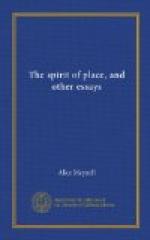Round images lie in the dark waters, but in the bright waters the sun is shattered out of its circle, scattered into waves, broken across stones, and rippled over sand; and in the shallow rivers that fall through chestnut woods the image is mingled with the mobile figures of leaves. To all these waters the agile air has perpetual access. Not so can great towns be watered, it will be said with reason; and this is precisely the ill-luck of great towns.
Nevertheless, there are towns, not, in a sense, so great, that have the grace of visible wells; such as Venice, where every campo has its circle of carved stone, its clashing of dark copper on the pavement, its soft kiss of the copper vessel with the surface of the water below, and the cheerful work of the cable.
Or the Romans knew how to cause the parted floods to measure their plain with the strong, steady, and level flight of arches from the watersheds in the hills to the and city; and having the waters captive, they knew how to compel them to take part, by fountains, in this Roman triumph. They had the wit to boast thus of their brilliant prisoner.
None more splendid came bound to Rome, or graced captivity with a more invincible liberty of the heart. And the captivity and the leap of the heart of the waters have outlived their captors. They have remained in Rome, and have remained alone. Over them the victory was longer than empire, and their thousands of loud voices have never ceased to confess the conquest of the cold floods, separated long ago, drawn one by one, alive, to the head and front of the world.
Of such a transit is made no secret. It was the most manifest fact of Rome. You could not look to the city from the mountains or to the distance from the city without seeing the approach of those perpetual waters—waters bound upon daily tasks and minute services. This, then, was the style of a master, who does not lapse from “incidental greatness,” has no mean precision, out of sight, to prepare the finish of his phrases, and does not think the means and the approaches are to be plotted and concealed. Without anxiety, without haste, and without misgiving are all great things to be done, and neither interruption in the doing nor ruin after they are done finds anything in them to betray. There was never any disgrace of means, and when the world sees the work broken through there is no disgrace of discovery. The labour of Michelangelo’s chisel, little more than begun, a Roman structure long exposed in disarray—upon these the light of day looks full, and the Roman and the Florentine have their unrefuted praise.




